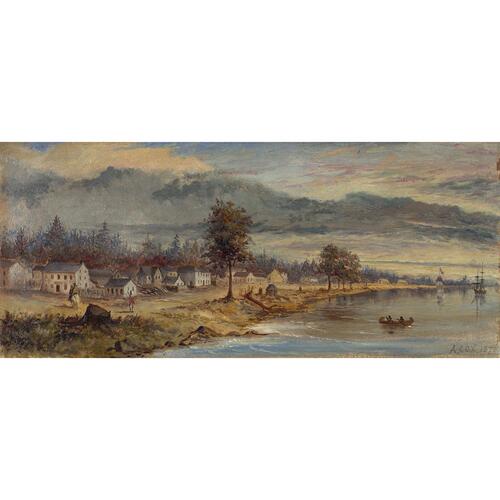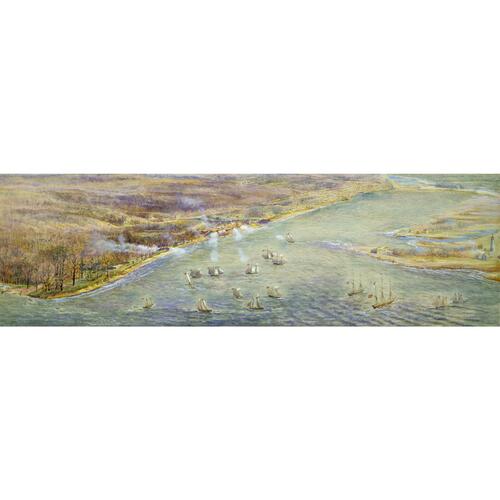
Source: Link
BENTLEY, ELIJAH, farmer, Baptist minister, and office holder; son of Samuel Bently, “a steady Loyalist during the american war”; m. with three children; fl. 1799–1814.
Elijah Bentley’s life in Upper Canada is little more than a series of fragments highlighted by his trial for sedition during the War of 1812. In 1799 Samuel Bently, a blacksmith and scythe-maker, probably from Rhode Island or Massachusetts, led his sons Reuben, Elijah, and Ira and two sons-in-law into Upper Canada. Reuben and Elijah brought their families; the others planned to return for theirs upon obtaining land. Elijah farmed briefly on a rented lot in Clinton Township and in 1801 received a grant, which he patented, in Markham Township, also the choice of the rest of his family. When Elijah sold his lot in 1805, he had cleared more than eight acres, fenced seven, and built a house. Whether he subsequently purchased or rented another lot is not known, but, by his own account, he continued to reside and farm in the area until 1814.
The Bentleys had probably been Baptists in the United States, and following their arrival in Upper Canada Elijah became increasingly involved in the province’s rapidly expanding Baptist community. The church advanced steadily before the War of 1812: in 1802 missionaries of American Baptist associations commenced regular tours in the colony, and Michael Smith, the Baptist preacher and author, reported in 1813 that there were 15 churches and 11 resident preachers. Bentley himself had established a church at Markham in 1803. Two years later he was ordained by elders Reuben Crandall*, Joseph Winn, and Abel Stevens*. He hoped to take advantage of the wording of the Marriage Act of 1798, which extended the authority to perform legal marriages, hitherto the privilege of the Church of England, to “members of the Church of Scotland, or Lutherans, or Calvinists.” The act was intended to defuse opposition to the Church of England’s favoured position, but it was clearly limited to Lutherans and Presbyterians. Although one Baptist minister, Crandall, had gained the right to solemnize marriages, Bentley’s own hopes were quickly dashed. After setting aside his initial application because it lacked “sufficient proof” of his ordination, on 8 April 1806 the Court of Quarter Sessions for the Home District, which included William Jarvis and William Willcocks, rejected it as “being under the signature of one, who states himself a Baptist.” Bentley next appears in records in 1809, when at a church conference in Townsend (Nanticoke) he urged the Baptists there to break with the Vermont-based Shaftsbury Association and join the Thurlow Association, which had been formed in 1802 in Thurlow Township. The next year, as an agent of the Thurlow Association, he visited Baptist churches throughout the province.
Bentley’s activities were not limited to the church. On 10 April 1805 he was appointed one of three constables for Markham. More important was the notice taken of the Bentley family’s espousal of Robert Thorpe*’s candidacy in the election of 1807. Lieutenant Governor Francis Gore* believed the political inclinations of the opposition associated with Thorpe to be democratic. Moreover, he considered American emigrants, such as the Bentleys, to have “brought the very worst principles of their own constitution with them.” The papers of the Executive Council contain an alphabetical list of 346 signatories, including the Bentleys, to an 1807 petition supporting Thorpe. It is worth noting that 12, and possibly 13, of the 32 men charged in 1813 with treason in the Home District had signed the 1807 petition.
Just a month before the outbreak of war in June 1812, Bentley was assisting Surveyor General Thomas Ridout* with a project of some sort in Markham. The war upset the equipoise of his life. The dubious allegiance of non-loyalist American settlers, whom Smith estimated at 60 per cent of the population, now became one of the foremost concerns of military and civil officials. Even after the victories at Detroit and Queenston Heights in 1812, disaffection and treason plagued the colony’s military administrators. The occupations of York (Toronto) in 1813 revealed to élites throughout the province a sub-political seam of discontent and republican sentiment within the Home District. Public declarations of sympathy for the enemy, incautiously uttered tavern oaths denouncing monarchy, crude egalitarian declamations, and fraternization with the enemy spurred civil authorities such as William Allan* and William Dummer Powell* to urge coercive measures “to suppress the disloyal and confirm the wavering.” The administrator of the province, Francis Rottenburg*, was duly alarmed and on 13 Aug. 1813 he ordered the acting attorney general, John Beverley Robinson*, to report on “dangerous and treasonable inclinations.” The next day Robinson met with Allan, Ridout, Alexander Wood*, Duncan Cameron*, and John Strachan*. On the 16th they submitted a cursory analysis which caught the prevailing spirit of official anxiety by pressing the need for “the influence of some present example.” Robinson suggested the formation of a committee to prepare an official report. Rottenburg agreed; the aforementioned group, with Robinson replaced by his brother Peter*, began work immediately.
The committee reported on 29 September; 64 depositions had been taken and 32 men were subsequently charged. Although anxious to make examples, the members of the committee were not the dupes of their own prejudices. Of the depositions, they astutely commented: “Some are mixed with prejudice, some with malice, others are clear and pointed.” The greatest number for one person, 11 in all, concerned Bentley. One deponent, Samuel Heron, had heard Bentley deliver a sermon in which he “thanked God there was never such freedom for poor people in York as there was since General [Henry] Dearborn set foot in it.” Others claimed that Bentley had publicly described himself as a “great friend to the United States And no friend to the King” and that he had directed American troops to government stores, “endeavoured to alienate the minds of His Majesty’s Subjects from the Government,” and sought a parole for his son Benjamin. One even commented, perhaps justly, that Bentley was “more dangerous from his great opportunities as a Preacher.”
Bentley was charged with seditious utterance, spreading false intelligence, and inviting the militia to accept Dearborn’s offer of parole. He appeared before the Home District Assizes on 26 Oct. 1813 but on Robinson’s motion was released on bail for trial on 31 March 1814. On this occasion the trial judges were the chief justice, Thomas Scott*, and the associate justice, Ridout. Bentley pleaded not guilty, but after hearing the testimony of four witnesses the petit jury found him guilty. The following day Scott sentenced him to serve six months in jail and to give bonds to keep the peace for five years. On 18 July a chastened Bentley petitioned George Gordon Drummond* , Rottenburg’s successor, to commute the remainder of his sentence on the grounds that “a larger confinement threatens the ruin of his health & property.” Whether he was released is not known. Presumably he survived his incarceration and immediately returned to the United States with his family. Members of the extended family continued to reside in Markham, but Samuel and Ira, who were indicted at the great treason trial held at Ancaster in 1814 [see Jacob Overholser], also left. Although the war proved only a temporary set-back to the Baptists in Upper Canada, without Bentley the church in Markham took 25 years to recover.
Bentley’s arrest and imprisonment highlight a basic feature of Upper Canadian politics in the years prior to the war – the association, by many government officials, of American settlers with democratic politics. This perception was undoubtedly true. The most notorious traitors, the men of Joseph Willcocks’s Company of Canadian Volunteers, were (with the exception of Willcocks himself) American-born. At a less active level of involvement, a man such as Bentley illustrates perfectly the meaning of “dubious allegiance.” Although his political impulses were always suspect, he was willing to avow openly his sympathy for a more democratic and egalitarian society only when it seemed that the province had been lost to the Americans. In the end the British prevailed, but the actions of men like Bentley undermined the traditional civilian opposition to military demands for martial law or the suspension of habeas corpus. Sedition and treason during the war hardened the anti-American, anti-democratic strain in the colony’s political culture and resulted in attitudes that shaped political battles years later, such as the alien issue of the 1820s [see Barnabas Bidwell*].
[I am grateful to Dr Marget Meikleham, who kindly shared the results of her own research in American Baptist sources. These records did not provide any further clues to Bentley’s career after 1814. r. l. f.]
AO,
Cite This Article
Robert Lochiel Fraser III, “BENTLEY, ELIJAH,” in Dictionary of Canadian Biography, vol. 5, University of Toronto/Université Laval, 2003–, accessed December 16, 2025, https://www.biographi.ca/en/bio/bentley_elijah_5E.html.
The citation above shows the format for footnotes and endnotes according to the Chicago manual of style (16th edition). Information to be used in other citation formats:
| Permalink: | https://www.biographi.ca/en/bio/bentley_elijah_5E.html |
| Author of Article: | Robert Lochiel Fraser III |
| Title of Article: | BENTLEY, ELIJAH |
| Publication Name: | Dictionary of Canadian Biography, vol. 5 |
| Publisher: | University of Toronto/Université Laval |
| Year of publication: | 1983 |
| Year of revision: | 1983 |
| Access Date: | December 16, 2025 |




